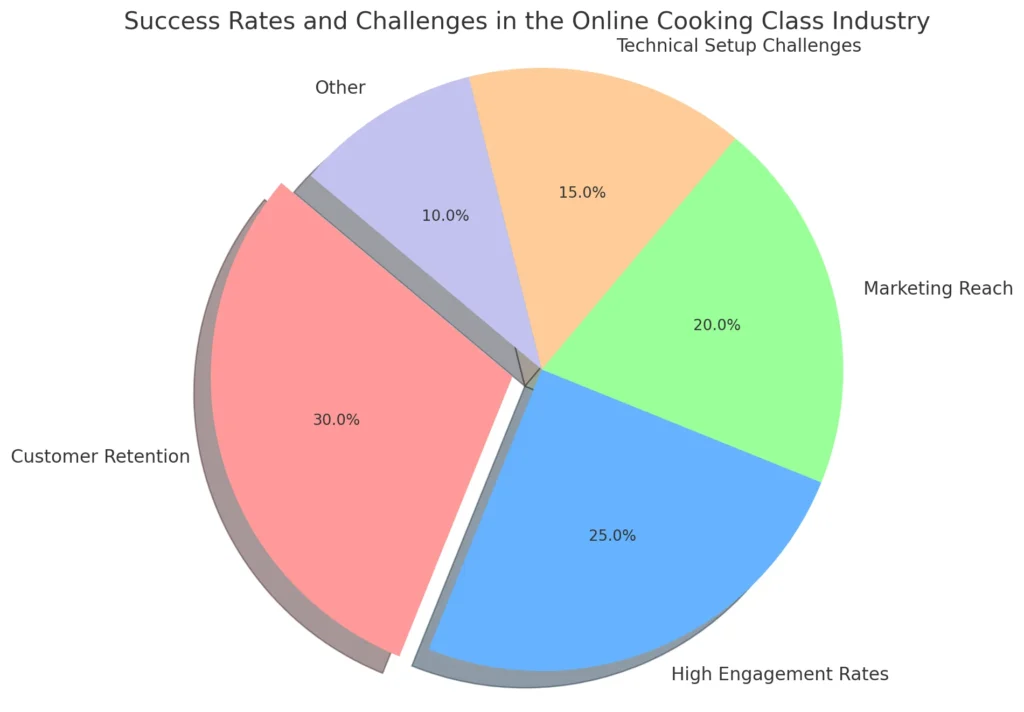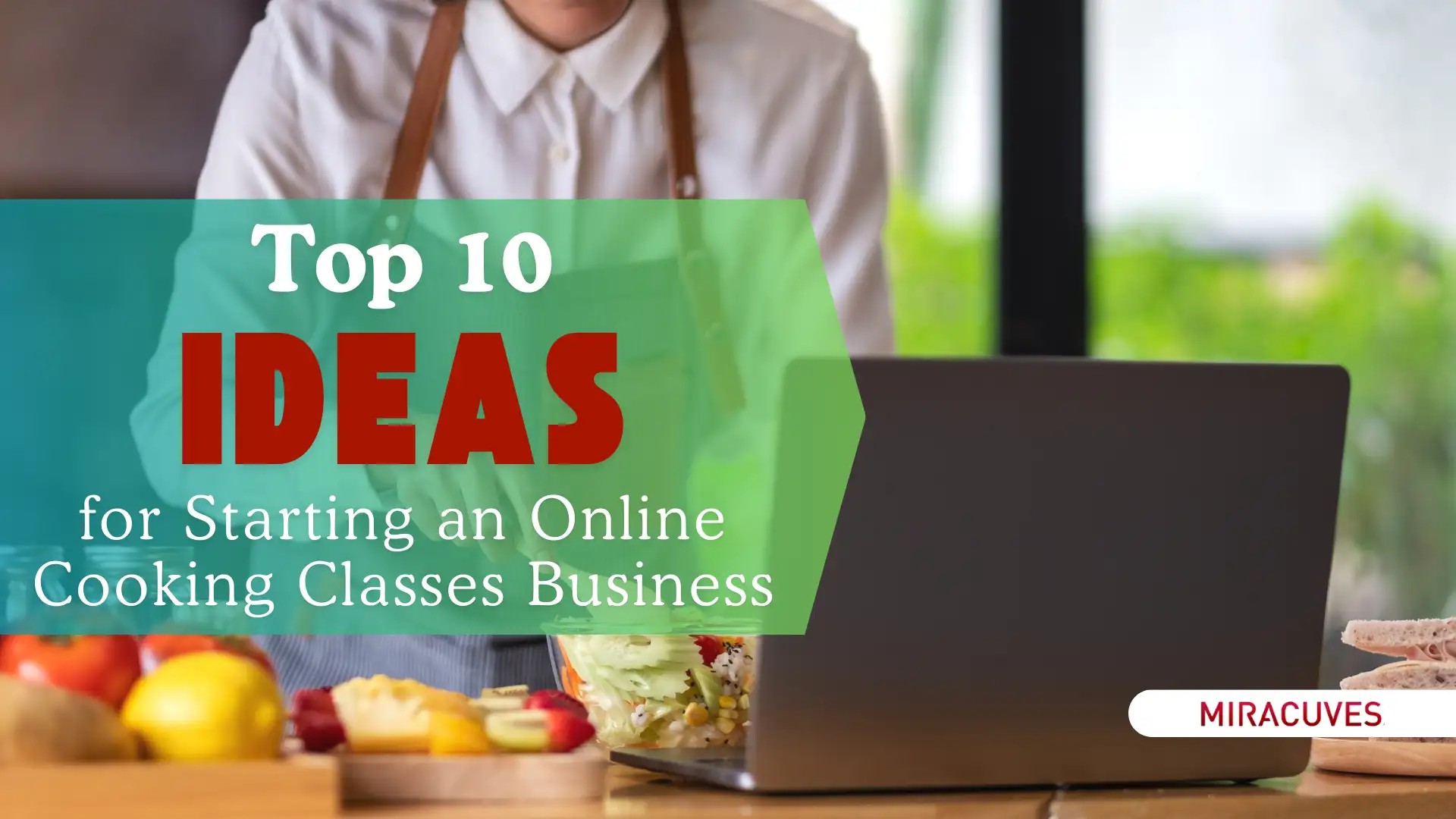In today’s fast-paced world, online cooking classes have soared in popularity, blending convenience with a passion for culinary skills. For entrepreneurs, this industry presents a unique opportunity to tap into a broad audience of food enthusiasts, from busy professionals seeking quick meal hacks to aspiring chefs eager to master gourmet techniques. With a growing demand for flexible, accessible learning options, online cooking classes offer the perfect platform to share expertise and creativity with a global audience.
| Metric | Data (2024) |
|---|---|
| Global Market Size | $2.4 billion |
| Annual Growth Rate | 10% |
| Popular Course Types | Plant-Based, Baking, International Cuisines |
| Top Consumer Demographics | Millennials, Busy Professionals, Culinary Hobbyists |
| Trending Technologies | Live Streaming, Interactive Q&A, AR/VR for Cooking Techniques |
Why Choose Online Cooking Classes?
Starting an online cooking class business is more than just sharing recipes—it’s about connecting with a growing community eager to learn, experiment, and enjoy food in new ways. With the online learning industry booming, cooking classes have carved out a unique space by providing hands-on experiences from the comfort of home. In 2024, the market for online cooking classes continues to expand as people seek flexible learning options that fit into their busy lives and diverse culinary interests.
From novice home cooks to seasoned food lovers, the audience for online cooking classes is vast. The appeal lies in its accessibility—whether it’s mastering quick weekday dinners or diving deep into pastry skills, online classes offer something for everyone. Plus, with trending features like live Q&A sessions, virtual cook-alongs, and specialty workshops, online cooking classes have adapted to deliver interactive, personalized experiences that cater to specific interests.
Current Trends and Future Opportunities in Online Cooking Classes
| Trend/Technology | Description | Impact on Industry |
|---|---|---|
| Live Streaming | Real-time cooking classes with Q&A | Enhanced interaction and personalized learning |
| Augmented Reality (AR) | Visual aids for complex techniques | Increased accessibility for difficult skills |
| On-Demand Mini Courses | Short, skill-focused lessons | Flexibility for busy learners and casual hobbyists |
| Virtual Reality (VR) | Immersive, virtual kitchen environments | Potential to revolutionize the hands-on experience |
The online cooking class industry is constantly evolving, keeping pace with technology, lifestyle changes, and shifting food interests. Today’s trends highlight the demand for personalized and immersive experiences, as well as the rising interest in specific cooking niches. From plant-based cooking to globally-inspired flavors, these classes cater to increasingly diverse tastes. This evolution has opened exciting avenues for entrepreneurs looking to tap into niche markets.
Some of the top trends include interactive classes with real-time feedback, where students can ask questions and receive immediate answers. Technologies like augmented reality (AR) are beginning to make waves, allowing users to visualize complex cooking techniques step-by-step. Additionally, short, on-demand courses are gaining popularity, offering focused lessons on specific skills like bread-making or sushi preparation without the time commitment of a traditional class.
Looking to the future, the possibilities continue to grow. Innovations like virtual reality (VR) could soon allow students to step into virtual kitchens and learn alongside their favorite chefs. As the market for online education expands, the online cooking class industry is poised for significant growth, creating ample opportunities for new and exciting business ideas.
Top 10 Ideas for Starting an Online Cooking Classes Business
Starting an online cooking class business opens the door to a range of exciting and profitable niches. From beginner-friendly classes to specialized culinary techniques, there are endless possibilities to cater to diverse interests and skill levels. Here are ten inspiring ideas to kickstart your venture, each offering unique ways to connect with your audience.
| Idea | Startup Cost | Target Market | Profit Potential |
|---|---|---|---|
| Beginner Cooking Basics | Low | Busy individuals, young adults | Moderate |
| Healthy & Plant-Based Cooking | Moderate | Health-conscious individuals | High |
| International Cuisines | Moderate to High | Foodies, travelers | High |
| Kids’ Cooking Classes | Low | Parents, guardians | Moderate |
| Baking and Pastry Mastery | Moderate to High | Hobby bakers, pastry enthusiasts | High |
| Meal Prep and Planning | Low to Moderate | Professionals, parents | Moderate |
| Food Photography for Home Chefs | Moderate to High | Food bloggers, influencers | High |
| Specialty Diet Cooking | Moderate | Keto, Paleo, gluten-free followers | High |
| Quick & Easy Weeknight Meals | Low | Working professionals, families | Moderate |
| Gourmet Cooking Techniques | High | Culinary enthusiasts, experienced cooks | High |
1. Beginner Cooking Basics
- Why: Ideal for people new to cooking who need guidance on essential skills.
- Startup Requirements: Basic kitchen setup, camera equipment, and beginner-friendly recipes.
- Target Market: Busy individuals, young adults, and college students.
- Estimated Costs: Low setup cost for basic classes.
2. Healthy & Plant-Based Cooking
- Why: With the rise of health-conscious eating, these classes attract a growing audience.
- Startup Requirements: Knowledge of plant-based recipes, nutritional guidance, and video equipment.
- Target Market: Health-focused individuals and those exploring vegan or vegetarian diets.
- Estimated Costs: Moderate, for quality ingredients and recipe testing.
3. International Cuisines
- Why: Travel lovers and food enthusiasts enjoy learning authentic global recipes.
- Startup Requirements: Ingredients from various cultures, high-quality camera for detailed shots.
- Target Market: Foodies, travelers, and cultural enthusiasts.
- Estimated Costs: Moderate to high, depending on ingredient accessibility.
4. Kids’ Cooking Classes
- Why: Cooking classes for kids offer fun, hands-on activities for young chefs.
- Startup Requirements: Kid-friendly recipes, safety tips, and engaging teaching style.
- Target Market: Parents and guardians seeking educational activities.
- Estimated Costs: Low, as recipes are typically simple and inexpensive.
5. Baking and Pastry Mastery
- Why: Baking enthusiasts enjoy mastering techniques like bread making and cake decorating.
- Startup Requirements: Baking tools, ingredient sourcing, and skill-focused curriculum.
- Target Market: Hobby bakers, aspiring pastry chefs, and dessert lovers.
- Estimated Costs: Moderate to high for specialized ingredients and equipment.
6. Meal Prep and Planning
- Why: Busy individuals look for ways to simplify weekly meal prep.
- Startup Requirements: Practical recipes, storage tips, and efficient meal planning strategies.
- Target Market: Professionals, parents, and students.
- Estimated Costs: Low to moderate, depending on ingredients.
7. Food Photography for Home Chefs
- Why: Teaches the art of food photography, perfect for bloggers and social media.
- Startup Requirements: Photography equipment and knowledge of plating and lighting.
- Target Market: Food bloggers, influencers, and hobby chefs.
- Estimated Costs: Moderate to high, depending on camera and lighting equipment.
8. Specialty Diet Cooking (e.g., Keto, Paleo)
- Why: Helps those with specific dietary needs create enjoyable, compliant meals.
- Startup Requirements: Understanding of dietary guidelines, ingredient sourcing.
- Target Market: People following keto, paleo, or gluten-free diets.
- Estimated Costs: Moderate, as specialty ingredients may be required.
9. Quick & Easy Weeknight Meals
- Why: Practical recipes for quick, delicious meals appeal to busy schedules.
- Startup Requirements: Simple ingredients, easy-to-follow steps, and time-saving tips.
- Target Market: Working professionals and families.
- Estimated Costs: Low, focused on basic ingredients and minimal equipment.
10. Gourmet Cooking Techniques
- Why: Advanced classes attract food lovers eager to expand their skills.
- Startup Requirements: Specialized tools, high-quality ingredients, and advanced recipes.
- Target Market: Experienced home cooks and culinary enthusiasts.
- Estimated Costs: High, for unique ingredients and professional-grade tools.
Real-World Examples or Case Studies
Seeing the success of others can provide powerful inspiration for launching your own online cooking class business. Many entrepreneurs have found incredible success by tapping into unique niches, creating interactive, high-quality experiences that cater to specific culinary interests. These real-world examples showcase how flexibility, creativity, and niche focus can lead to a thriving online cooking class.

Some businesses, for instance, have specialized in seasonal cooking, using fresh ingredients to craft dishes that match the season’s flavors. Others have focused on global flavors, offering monthly subscriptions where students explore a different cuisine each month. Businesses like these demonstrate the appeal of curated experiences, giving participants a deep, immersive look into a particular culinary style or theme.
Another successful approach is the “masterclass” format, where experienced chefs or culinary experts lead intensive classes on advanced cooking techniques. This approach often draws enthusiastic food lovers who want to challenge their skills. These examples illustrate how tailored, thoughtfully designed courses can attract a loyal following, resulting in a successful, profitable online cooking business.
Mistakes to Avoid When Starting an Online Cooking Classes Business
Launching an online cooking class business can be rewarding, but it’s essential to avoid common mistakes that could hinder growth. Many new entrepreneurs dive in with enthusiasm but sometimes overlook critical details that can make or break their venture. Here are some of the most common pitfalls to watch out for and tips to stay on track.
| Common Mistake | Preventive Measure |
|---|---|
| Poor Audio or Visual Quality | Invest in good lighting and clear audio equipment |
| Undefined Target Audience | Choose a niche to focus on a specific group of learners |
| Pricing Too Low or High | Research competitors to set balanced, competitive rates |
| Lack of Student Interaction | Incorporate live Q&A sessions or follow-up support |
One frequent mistake is underestimating the importance of a quality setup. Poor lighting or sound can make even the best cooking lesson feel less engaging, so invest in clear audio and a bright, well-organized cooking space. Another common issue is failing to define a specific target audience. Without a clear focus, marketing efforts can be scattered, making it harder to attract loyal viewers. Choosing a niche—such as healthy cooking, quick meals, or desserts—can help you connect more deeply with your intended audience.
Pricing can also be a stumbling block. Charging too little undervalues your skills, while high fees may scare away potential customers. Research competitor pricing to find a balanced rate that reflects your experience and the value of your content. Lastly, don’t overlook the importance of interactivity; offering live Q&A sessions or follow-up support can keep students engaged and boost satisfaction.
Why Trust Miracuves Solutions for Your Next Project?
When starting an online cooking class business, having the right technical partner can make all the difference. Miracuves Solutions stands out as a trusted choice for bringing your vision to life, offering not just development expertise but a genuine commitment to your success. With a proven track record of creating innovative on-demand app solutions, Miracuves Solutions understands the unique needs of online learning platforms, especially those tailored for interactive, user-friendly experiences.
At Miracuves Solutions, we prioritize seamless user experiences, so your audience can focus on learning without any tech barriers. Whether you’re looking to implement real-time streaming, personalized class scheduling, or secure payment processing, our solutions are designed to keep your online cooking class running smoothly. Plus, with a strong focus on data security and responsive design, we ensure that both you and your students have a reliable, enjoyable platform to connect and grow.
Our team’s deep understanding of the online education market allows us to bring insights that help your business thrive. We work closely with you to integrate custom features and create a platform that aligns with your unique brand, setting your business up for long-term success.
Conclusion
Starting an online cooking class business can be an exciting and profitable journey, offering a chance to share your passion for food with a global audience. With the growing demand for flexible, hands-on learning experiences, now is the perfect time to dive into this dynamic industry. Whether you focus on beginner cooking basics, international cuisines, or health-focused meals, choosing a unique niche and providing a quality experience can set you apart and drive your success.
By carefully planning your approach, avoiding common mistakes, and delivering engaging, valuable content, you’ll be well on your way to building a thriving online cooking class business. Take the leap, bring your culinary vision to life, and start making an impact on aspiring chefs everywhere!
FAQs
What equipment do I need to start an online cooking class?
To start, you’ll need a high-quality camera, clear audio equipment, good lighting, and a well-organized kitchen space. A stable internet connection is also essential for live classes.
How do I attract students to my cooking classes?
Focus on marketing through social media, create engaging content to showcase your skills, and consider offering a few free sessions or discounts to build an initial following.
What platform should I use to host my classes?
You can use video platforms like Zoom for live sessions or create a dedicated website with on-demand videos. Choose what best fits your teaching style and audience needs.
How do I price my online cooking classes?
Research similar classes to set a competitive rate. Consider offering different pricing options, such as one-time classes, bundles, or memberships, to appeal to a wider range of students.
Do I need any certifications to teach cooking classes online?
While certifications aren’t mandatory, they can add credibility. Some instructors take culinary courses or obtain food safety certifications, which can boost trust with students.







